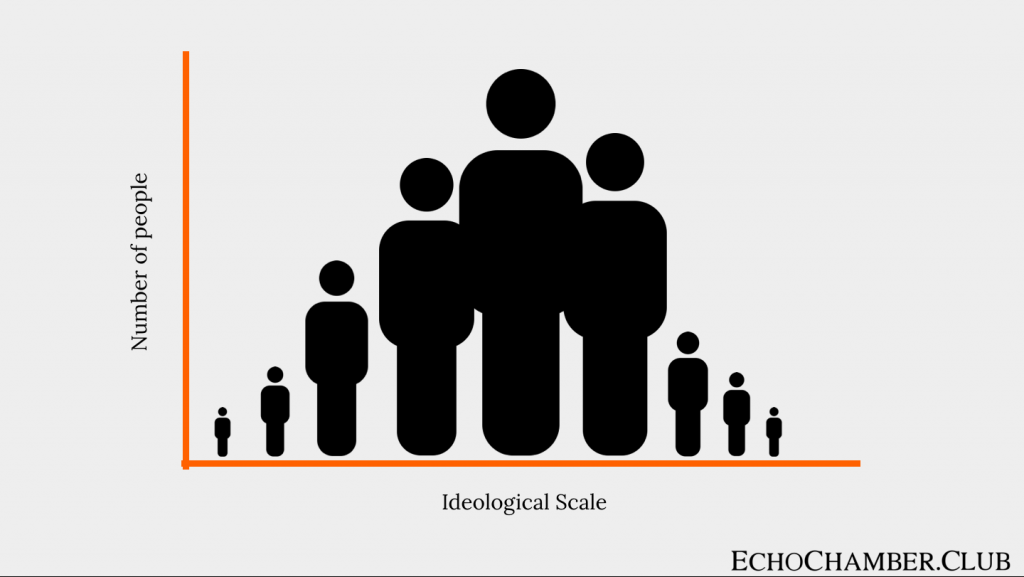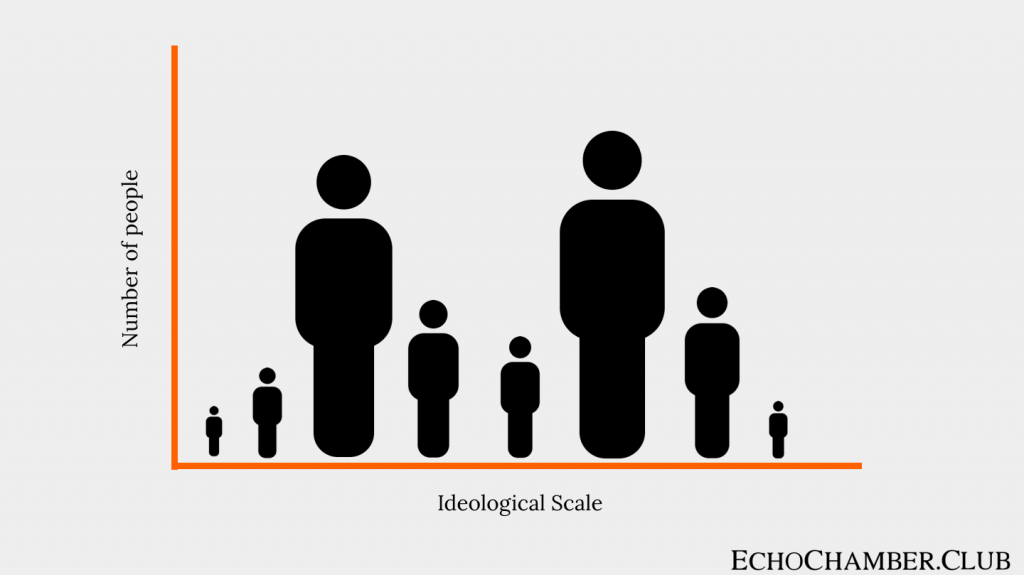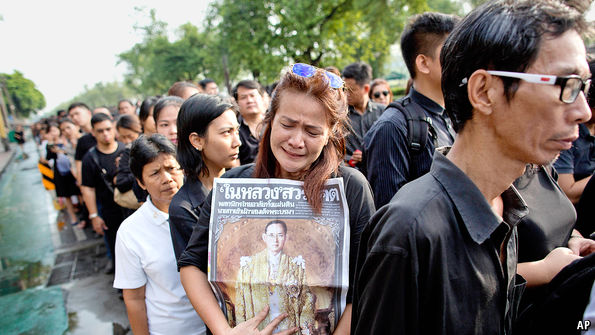
This article originally appeared in Drugstore Culture in October 2018
“We are a nation divided.” This assertion about the condition of British politics is now stated with such conviction few dare challenge it. But should they? This week, the digital think-tank WebRoots Democracy invited the neuroscientist, Kris De Meyer, the machine learning specialist, Rula Awad and me to Newspeak House in east London to discuss whether we are more polarised than ever before.
From the outset, I’ll confess I’ve got very strong opinions on the subject. This is because I truly value diversity of opinions and lifestyles in any one community, and I’ve gone on a long and personal journey to understand the concept of ‘echo chambers’ and how our information environment is changing.
In the first half of this decade the core concept was often advanced but not broadly accepted. To generalise from the academic literature on the subject: the essential argument is that echo chambers limit an individual’s access to different kinds of information.
This constrained access leads, in turn, to polarisation, and polarisation is bad for democracy. Cass Sunstein, the first to coin the phrase, worried about whether individuals would be able to function as citizens if all they received was highly-personalised news. Our bespoke information environments would be so different that there would be no shared public space in which we could all come together and seek democratically-negotiated solutions to society’s most pressing problems.
In 2011, Eli Pariser took a different view. His concern was for our individual liberty and freedom of thought. If search engines and social algorithms could generate vastly different answers to the same question when asked by people with dissimilar algorithmic profiles, then how could we know that the decisions we made as a consequences were objective?
Although both wrote best-selling books, it took the earth-shaking election of Donald Trump and the Brexit referendum in 2016 for the concept of echo chambers to be catapulted into the mainstream. These events were not just shocking to the pundits who failed to predict them, but also, in many cases, for the politicians who had actually campaigned for the (unexpectedly) victorious side.
As the political and media class clutched at straws, many instant theories were put forward to explain the unanticipated results. The prevalence of echo chambers provided an obvious conceptual fit. It was thought that Trump’s supporters and Brexit voters had lurked in such a powerful and persuasive digital silos that they couldn’t have voted rationally. The implication was: if only they had listened to the other side, then things would have been different.
My experience working in polarisation and echo chambers
I took a slightly different tack. I learned a long time ago – and continue to learn – that you can rarely change other people, but that you can change yourself. So, whilst I was fielding phone calls from technologists, activists and journalists who sought to understand how they could break the seal of other people’s filter bubbles, I instead tried to puncture my own. How could I discover and understand the views of other people who inhabited completely different social settings, with completely different beliefs and experiences?
Thus the Echo Chamber Club was born, and I began actively to seek out views that I wouldn’t ordinarily environment in my immediate work and friendship group. I looked for perspectives in favour of Brexit, against immigration, and in favour of Putin. I challenged my own views on the economy, on democracy and international relations. I learned how you could be pro-life and a feminist, I began to support safe spaces, and I realised that homogeneity was not restricted to political groups: the assumption, for instance, that Hulu’s production The Handmaid’s Tale was somehow a parable of Trump’s America – chronological nonsense, since the series was commissioned long before his election – had become an unchallenged orthodoxy across mainstream platforms.
In many cases this work was emotionally very difficult. But it could also be incredibly illuminating. I learned I had to read difficult books and articles up to three times before I actually engaged with what the writer was saying. My first interpretation would often be polluted by my pre-existing suppositions. I had to grapple with strange words and new contexts. And I had to dig deep into my own belief system to understand why other groups felt so frustrated with my worldview. I realised that simply reading one article about someone else’s viewpoint is nothing like enough if you are seeking something approaching intellectual empathy. You have to speak their language, walk in their shoes, and become versed in a completely new system of beliefs truly to appraise it.
Today, the conversation has shifted from this initial emphasis upon echo chambers. But there is still huge concern about polarisation and a general presumption that it is mutilating our democracy.
It’s important to note that polarisation, at least in academic circles, does not refer to how we disagree with each other. It does not refer to whether we scream at the other side, or manage, somehow, to coexist peacefully. Instead, it just measures the extent of the disagreement. In the first image we see a community where there is an established consensus on a particular issue, or set of issues. In the second we see polarisation.


The event
Kris De Meyer is a neuroscientist who specialises in how we make decisions, and how these decisions lead to polarisation. “Our psychology hasn’t changed in the past two, nor 20, nor even the past thousand years” he argues. One of psychology’s most arresting findings is that our actions can change our beliefs – rather than, as one might automatically suppose, the other way round.
Imagine a voter who was undecided two months before the 2016 Brexit referendum, and – after weighing up the pros and cons – tentatively chose to vote Remain. Vacillating up until polling day, she would subsequently convince herself with growing confidence that her choice had been right. We tend to justify our past decisions retroactively and consequently become more entrenched in a position that may often have been initially reached with considerable uncertainty. De Meyer argues that the tendency in many democratic contests to offer binary options – In or Out, this party or that one – is a recipe for polarisation since it forces people to make clear-cut decisions which they later feel ever-more determined to justify.
He notes that conforming to the mores of our community is a natural consequence of the way in which our brains work. Children as young as three months old often show signs of favouring those that share their preferences and are helpful to them. We enjoy being around people who hold similar opinions, even if – as is the case with many liberals – those opinions have their foundational assumption in the belief that we are independent as individuals.
Strikingly, Rula Awad, a machine learning expert who has studied division extensively, says that “there is little evidence to show we are becoming more polarised”. She contends that although there has been a slight increase in political division in recent years, this pattern seems to show a fairly cyclical swing away from an old consensus – which pretty much in line with historical precedent. Even more intriguingly, Awad argues that “the evidence shows that the internet and social media exposes us to more varied perspectives than we would have encountered in a pre-digital age” [my italics].
Let’s get back to first principles: why are we so upset about polarisation at all? It’s because we assume it will destabilise the democratic process and threaten civic cohesion. A government legislates in the interests of a specific group or group; there will correspondingly be a significant number of people who are opposed to that action. These people may soon feel disenfranchised and might even be tempted to take violent action. Ergo: all the sinews of the body politic must be stretched to prevent polarisation.
This is not my view. If polarisation – defined as significant disagreement – is so deeply threatening, in and of itself, then the supposedly higher cause of achieving a workable consensus should logically oblige one side to concede to the other. But neither side, of course, would be willing to do that. And why should they?
The philosophical flaw in the argument is the supreme value assigned to consensus and unity. But why should we think this way? I value innovative and fresh ideas, the challenge of new convictions and propositions. In any society, however consensual, there are always people who, for whatever reason, oppose the status quo. I don’t believe that because these minorities are too small to pose a substantial threat to stability, that they should be ignored.
We should care about our emotive feeling towards the other side, not polarisation per se
My point is that we are looking in the wrong place. The problem is not polarisation per se; it is our animosity towards the other side, which is not the same thing at all. The Pew Centre has shown that US Democrats are increasingly fearful of, angry with and frustrated by Republicans. The same is true of Republicans’ feelings towards Democrats. These are strong and potentially violent emotions, visible right now in the highly contentious campaigns for the mid-term elections on November 6.
If polarisation refers only to the extent of disagreement, my question is this: can we not confront that division – welcome it even, as a source of intellectual evolution – but find ways of controlling the aggressive feelings that often accompany it? How do we nurture a civic and social environment in which we feel psychologically safe, and yet can still voice seriously divergent opinions?
In the recent past, political rhetoric has tended to privilege the quest for convergence. In the 1997 Labour manifesto Tony Blair declared: “I want a Britain that is one nation, with shared values and purpose”. His guru, Anthony Giddens, wrote in 1994 that we need “a public arena in which controversial issues… can be resolved, or at least handled, through dialogue”. Nothing wrong with dialogue, of course. But the highest value was always assigned to consensus – as if it were intrinsically irrational to take issue with the ideas holding together the canvas of New Labour’s ‘Big Tent’.
This approach has not worked. It’s all very well to encourage consensus in small groups – in situations where the shape of a good outcome is fairly manifest. A jury strives to decide whether a particular person is guilty; Parliament votes on a specific piece of legislation. Note, however, that in both of these cases a lot of pre-emptive work has been done to ensure that all participants agree on the manner in which a decision should be reached. The rules of the game are agreed. The objective is to reach an agreement – or at least a respected majority opinion – on what conclusion should be drawn from the facts and arguments under deliberation.
But – like it or not – this approach simply does not translate to the broader public sphere. You cannot expect an entire population to behave like the House of Commons or a board meeting: this is an elementary category mistake.
Instead, we need to broaden the range of forums in which different views can be freely expressed. Instead of narrowing the debate to a soft common ground, we should encourage and enable different groups to set their agendas, to talk openly about the issues that are important to them and to seek new meanings in open dialogue. We should be able to express emotion without embarrassment.
Instead of flinching from disagreement we should acknowledge it as the lifeblood of democracy. Far from fearing strong opinions, we should be helping our fellow citizens to disagree with one another in the public sphere – in a civilized way, of course – so different ideas can flourish, minorities are able to express themselves and none feel excluded from the table.
It is a fool’s errand to try to minimise or paper over division, especially in a complex society. Indeed it is positively dangerous: it is precisely when opinion is suppressed or driven to the margins that emotion surges in ways that can become very scary. The great civic task is not to end polarisation, but to make it work.





